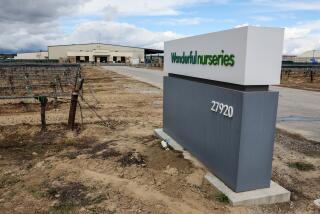Low Prices, High Interest Rates Spark New Wave of Activism : Farmers Stage Protests in Midwest
- Share via
CHICAGO — Besieged by hard times, thousands of farmers endured frigid winds and near-zero temperatures Monday to call attention to their plight in demonstrations at the Minnesota Capitol building and at the Chicago Board of Trade.
At least 12 farmers--including farm activist Wayne Cryts, a leader of the American Agriculture Movement--were arrested by Chicago police when they tried to force their way into the heavily guarded Board of Trade, the world’s largest commodity exchange. Cryts had hoped to lead demonstrators onto the exchange floor to force a halt to trading in corn, soybeans and wheat futures.
In Minnesota, at least 34 rural school districts closed and hundreds of small businesses locked their doors in a broad statewide show of support for farmers.
Monday’s demonstrations were the latest in a rising tide of activism among Midwestern farmers who are facing some of the worst economic conditions in half a century, as interest rates remain high and prices for the commodities they produce stay low.
They have begun to win the support of labor unions, particularly the United Auto Workers and the American Federation of State, County and Municipal Employees, and of small rural businesses.
The protests come two weeks before the Reagan Administration is to formally unveil its 1985 farm program and rural banks are scheduled to decide which farmers will qualify for spring planting loans. Those who do not qualify may be forced to sell their farms.
‘We’re Here Begging, Too’
“We’re here out of desperation,” said Steve Anderson, an Alma, Kan., farmer who was one of about 200 demonstrators in front of the towering Board of Trade building. “When you’re desperate, you do whatever it takes to make people listen.”
When a beggar approached a farmer in the demonstration and asked for some spare change, the farmer turned to him and said: “We’re here begging, too.”
With relatively little to do during the winter months, farmers have stepped up their protests. In the last two weeks alone, they have disrupted foreclosure auctions of farms and farm machinery in rural Iowa counties, held up banners in the gallery of the Iowa state Legislature as Gov. Terry Branstad delivered his state of the state address and attended meetings in Missouri and Iowa where officials of the Teamsters Union held discussions about organizing family farmers.
Several thousand more farmers from Nebraska, South Dakota and Iowa showed up for another rally in Sioux City, Iowa.
“It doesn’t take very much now to get farmers to come to meetings,” said Pete Brent, who is running a farm crisis hot line in Des Moines.
Protesters in Chicago, organized by the American Agriculture Movement--the same group that lead the motorcade of tractors to the Washington Mall in 1979--were demanding an end to practices on the Board of Trade that they say help to keep grain and bean prices down.
Cryts, who gained national attention in 1981 when he removed 33,000 bushels of soybeans from a bankrupt grain elevator, said “short-selling” trading is depressing grain and bean prices. Short selling is done by speculators who sell grain that they do not own in the hopes that they can eventually buy back enough to replace it at a lower price.
Board of Trade Chairman Thomas P. Cunningham, attired in his bright red trader’s jacket, told reporters that the futures markets are not the problem for marginal farmers and that prices on the board are set by supply and demand.
“They want to shoot the messenger and that went out 2,000 years ago,” said Cunningham, adding that he had met three times with Cryts and other farm protest leaders in the last five months and arranged for them to meet with federal agricultural officials last week.
“We sympathize with the plight of the marginal farmer,” Cunningham said. But he added that he did not think that the protesters spoke for American agriculture as a whole.
In a prepared statement, the Board of Trade blamed low grain prices on oversupply and the strong dollar, which makes U.S. commodities more expensive in foreign markets.
More to Read
Sign up for Essential California
The most important California stories and recommendations in your inbox every morning.
You may occasionally receive promotional content from the Los Angeles Times.










